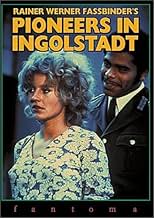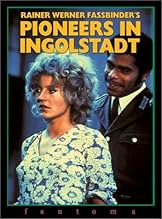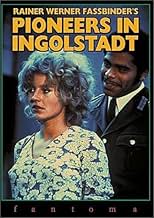IMDb RATING
6.3/10
657
YOUR RATING
Berta, a naive young maid, searches for love when the army engineers come to town to build a bridge.Berta, a naive young maid, searches for love when the army engineers come to town to build a bridge.Berta, a naive young maid, searches for love when the army engineers come to town to build a bridge.
- Director
- Writers
- Stars
- Director
- Writers
- All cast & crew
- Production, box office & more at IMDbPro
6.3657
1
2
3
4
5
6
7
8
9
10
Featured reviews
nope
This was the first Fassbinder's films to get any kind of remotely mainstream distribution. It finds the autuer in an interesting transitional phase from the Bresson-by-way-of-Straub/Huillet aesthetic of his earliest films to the Sirkian melodrama of what is considered his "mature" style.
This movie is also a fascinating, rare depiction of life under the Nazis before the beginning of WWII and the horrors we most associate with the Reich. Here, the Nazi "Pioneers" are almost like New Deal-style government sponsored work crews, improving the national infrastructure. But the film repeatedly implies that the march to war and slaughter were not merely the result of orders from above but also of the overboiling ids of men injected with nationalist and militarist fantasies who had no way of fully working out their violent/sexual impulses in their own cultural milieu.
10hasosch
Laying out topics for future movies
I cannot deny when many people think that "Pioniere Von Ingolstadt" (1971) was more of less an apprentice piece for Fassbinder, although he had already done a couple of feature films before. I have also no major arguments against those who criticize that both film and play (by Marielouise Fleisser) are basically content-less (why Brecht seriously recommended to perform it "not as whole, but in its parts"): "Pioneers" come into a small Southern German town, the girls, oppressed by the Bavarian patriarchs, are eager to escape with the next-best soldier who comes across them. However, they are disappointed, because they experience sex where they expect love. And the pioneers build a bridge -a really strange metaphor. Is this bridge, that probably never get finished, a connection between the oppressors and the oppressed, the rich (patriarchs) and the poor (servants, the two female lead-characters Alma and Berta or A and B)? The movie raises more question than it gives an answer why Fassbinder did it. Considering that social problems, especially such involved with women, will become central in Fassbinder's later work, we may speculate that here, he laid out all the topics to which he would come back in his following films.
Rough Fassbinder
If there's one thing that really bothers me about Fassbinder's history is how boggled his film chronology is. For someone who improved at such a consistent rate, it's really annoying in the case of his first 11 "anti-theater" films, that no one seems to know what order they came in.
According to the information on the recent DVD issue of this movie, "Pioneers" is the last of those first 11. Now, I could have sworn that "Beware of a Holy Whore" was Fassbinder's 11th film (which would make more sense, given that movie's self-reflexive 'biting the hand that feeds you' nature). Alas, maybe this one is number 11.
On a technical level, this is very much "early Fassbinder", which is best evidenced by Dietrich Lohmann's early cinematography. When working with Michael Ballhaus, Fassbinder was able to have his camera swoop around his characters. Even if they still weren't doing anything, it at least gave some external feel to the movie. Dietrich Lohmann is the polar opposite. He just points the camera, and occasionally pans it, as in one seen that pans back and forth between two characters talking for about 5 minutes. Fassbinder always loved long takes, and always liked giving a theatrical look to his movies, especially the early ones. Michael Ballhaus was able to nail this, but Lohmann's camera work always seemed a bit amateur. It worked great in "Effi Briest", and certain scenes of "Merchant of Four Seasons" and "American Soldier", but I can see why Michael Ballhaus slowly became Fassbinder's preferred camera man going into the mid-'70s.
That said, this movie is also indicative of Fassbinder's early career in that is stars seedy low lives. Before, he usually used gangsters, here he uses whores and bored, drunken soldiers (or 'pioneers'). They sit and drink and do typical Fassbinder stuff (occasionally have sex, occasionally beat someone up). There's some plot here and there. It definitely gives you what you're looking for when renting a Fassbinder movie, but certain scenes had a Fassbinder-by-numbers quality. In one of the final scenes, Hanna Schylla starts chasing after the morally bankrupt guy she's fallen in love with. I said under my breath "she's going to trip and fall and start to cry". I was right. Maybe I've seen too many Fassbinder movies, or maybe Fassbinder was treading a bit too much water with this one.
Like I said, this movie does the trick if you're looking for a Fassbinder fix, and in that, I have to commend it. It's just a movie best reserved for the devoted fans.
According to the information on the recent DVD issue of this movie, "Pioneers" is the last of those first 11. Now, I could have sworn that "Beware of a Holy Whore" was Fassbinder's 11th film (which would make more sense, given that movie's self-reflexive 'biting the hand that feeds you' nature). Alas, maybe this one is number 11.
On a technical level, this is very much "early Fassbinder", which is best evidenced by Dietrich Lohmann's early cinematography. When working with Michael Ballhaus, Fassbinder was able to have his camera swoop around his characters. Even if they still weren't doing anything, it at least gave some external feel to the movie. Dietrich Lohmann is the polar opposite. He just points the camera, and occasionally pans it, as in one seen that pans back and forth between two characters talking for about 5 minutes. Fassbinder always loved long takes, and always liked giving a theatrical look to his movies, especially the early ones. Michael Ballhaus was able to nail this, but Lohmann's camera work always seemed a bit amateur. It worked great in "Effi Briest", and certain scenes of "Merchant of Four Seasons" and "American Soldier", but I can see why Michael Ballhaus slowly became Fassbinder's preferred camera man going into the mid-'70s.
That said, this movie is also indicative of Fassbinder's early career in that is stars seedy low lives. Before, he usually used gangsters, here he uses whores and bored, drunken soldiers (or 'pioneers'). They sit and drink and do typical Fassbinder stuff (occasionally have sex, occasionally beat someone up). There's some plot here and there. It definitely gives you what you're looking for when renting a Fassbinder movie, but certain scenes had a Fassbinder-by-numbers quality. In one of the final scenes, Hanna Schylla starts chasing after the morally bankrupt guy she's fallen in love with. I said under my breath "she's going to trip and fall and start to cry". I was right. Maybe I've seen too many Fassbinder movies, or maybe Fassbinder was treading a bit too much water with this one.
Like I said, this movie does the trick if you're looking for a Fassbinder fix, and in that, I have to commend it. It's just a movie best reserved for the devoted fans.
Dull, Amateurish and Pointless
In an undefined period of time in Germany, the virgin maid Berta (Hanna Schygulla) expects to find her Prince Charming among the soldiers that are building a bridge over an old river. Her friend Alma (Irm Hermann) is a slut that shags during the night with different soldiers in the park or in the toilet of a nightclub and asks for money for her services.
When Berta meets the soldier Karl Lettner (Harry Baer), she falls in love with him. A couple of days later, she makes love with him and he says "Auf Wiedersehen" (goodbye) to her.
"Pioniere in Ingolstadt" is a dull, amateurish and pointless film by Rainer Werner Fassbinder. The period of time is inconsistent: based on the car, the clothing and the hairstyle, it seems to be 1971 but the soldiers wear Nazi uniforms. Further, the characters are thrown on the screen without any previous development. My vote is four.
Title (Brazil): "Pioneiros in Ingolstadt" ("Pioneers in Ingolstadt")
When Berta meets the soldier Karl Lettner (Harry Baer), she falls in love with him. A couple of days later, she makes love with him and he says "Auf Wiedersehen" (goodbye) to her.
"Pioniere in Ingolstadt" is a dull, amateurish and pointless film by Rainer Werner Fassbinder. The period of time is inconsistent: based on the car, the clothing and the hairstyle, it seems to be 1971 but the soldiers wear Nazi uniforms. Further, the characters are thrown on the screen without any previous development. My vote is four.
Title (Brazil): "Pioneiros in Ingolstadt" ("Pioneers in Ingolstadt")
fine, but for Fassbinder completists only
Pioneers of Ingolstadt is one of the early works of the inspired, prolific dramatic director RW Fassbinder, and it may be a very good minor work but minor all the same. It's about a group of soldiers who have been brought to the small town of Ingolstadt to build a bridge. Not much drama happens there as that goes as planned; the meat of the film is the interactions with the local women (i.e. Hanna Schygulla, Irm Herrmann who one might recall from The Merchant of Four Seasons), and how they have some varied personalities (Schygulla wants true love, Herrmann likes to fool around, another girl has... her own thoughts), while the men are, perhaps by design, practically all the same.
It speaks to how much I like Hannah Schygulla and some of Fassbinders other early/consistent players that this was not only watchable but okay, though at the same time it left me wanting more from the characters and from some of the filmmaking itself. As I have worked through Fassbinder's early filmography (as in before Whity and Beware of a Holy Whore and his breakthrough year 1972), I have found it somewhat hit and miss. Even more then his other work, this has such a detached feeling about it, how everyone is disillusioned but also holding back their emotions (in the Bressonian influence I'm sure), and I felt something I don't like when I'm watching a Fassbinder film: boredom.
Its like, we get it, these soldiers toiling at this small town bridge and the local girls who have nothing much else better to do than spend their time with these "pioneers" as they're ironically called, are at best aimless and at worst miserable and cruel and (in their way perhaps) more or less deserve each ether. But this point is driven by Fassbinder, adapting a play he didn't write for German TV, to the point where I didn't care that much for anyone. If it weren't for the natural screen presence of (most of) the actors it might be one or Rainer's lessor films - or, to put it another way, he's explored many of the same themes in other, stronger, more memorable works, or at least with more memorable characters.
And who knows, maybe it wasn't the best idea for me to check this out at the end of a very long work day on 5 hours of sleep. It also doesn't help that the cameraman here has some strange inspirational ideas like... Having a cheap one-light on a camera pointed at actors walking and talking in a dark street. But that's just one example.
It speaks to how much I like Hannah Schygulla and some of Fassbinders other early/consistent players that this was not only watchable but okay, though at the same time it left me wanting more from the characters and from some of the filmmaking itself. As I have worked through Fassbinder's early filmography (as in before Whity and Beware of a Holy Whore and his breakthrough year 1972), I have found it somewhat hit and miss. Even more then his other work, this has such a detached feeling about it, how everyone is disillusioned but also holding back their emotions (in the Bressonian influence I'm sure), and I felt something I don't like when I'm watching a Fassbinder film: boredom.
Its like, we get it, these soldiers toiling at this small town bridge and the local girls who have nothing much else better to do than spend their time with these "pioneers" as they're ironically called, are at best aimless and at worst miserable and cruel and (in their way perhaps) more or less deserve each ether. But this point is driven by Fassbinder, adapting a play he didn't write for German TV, to the point where I didn't care that much for anyone. If it weren't for the natural screen presence of (most of) the actors it might be one or Rainer's lessor films - or, to put it another way, he's explored many of the same themes in other, stronger, more memorable works, or at least with more memorable characters.
And who knows, maybe it wasn't the best idea for me to check this out at the end of a very long work day on 5 hours of sleep. It also doesn't help that the cameraman here has some strange inspirational ideas like... Having a cheap one-light on a camera pointed at actors walking and talking in a dark street. But that's just one example.
Did you know
Details
Box office
- Budget
- DEM 550,000 (estimated)
Contribute to this page
Suggest an edit or add missing content


































